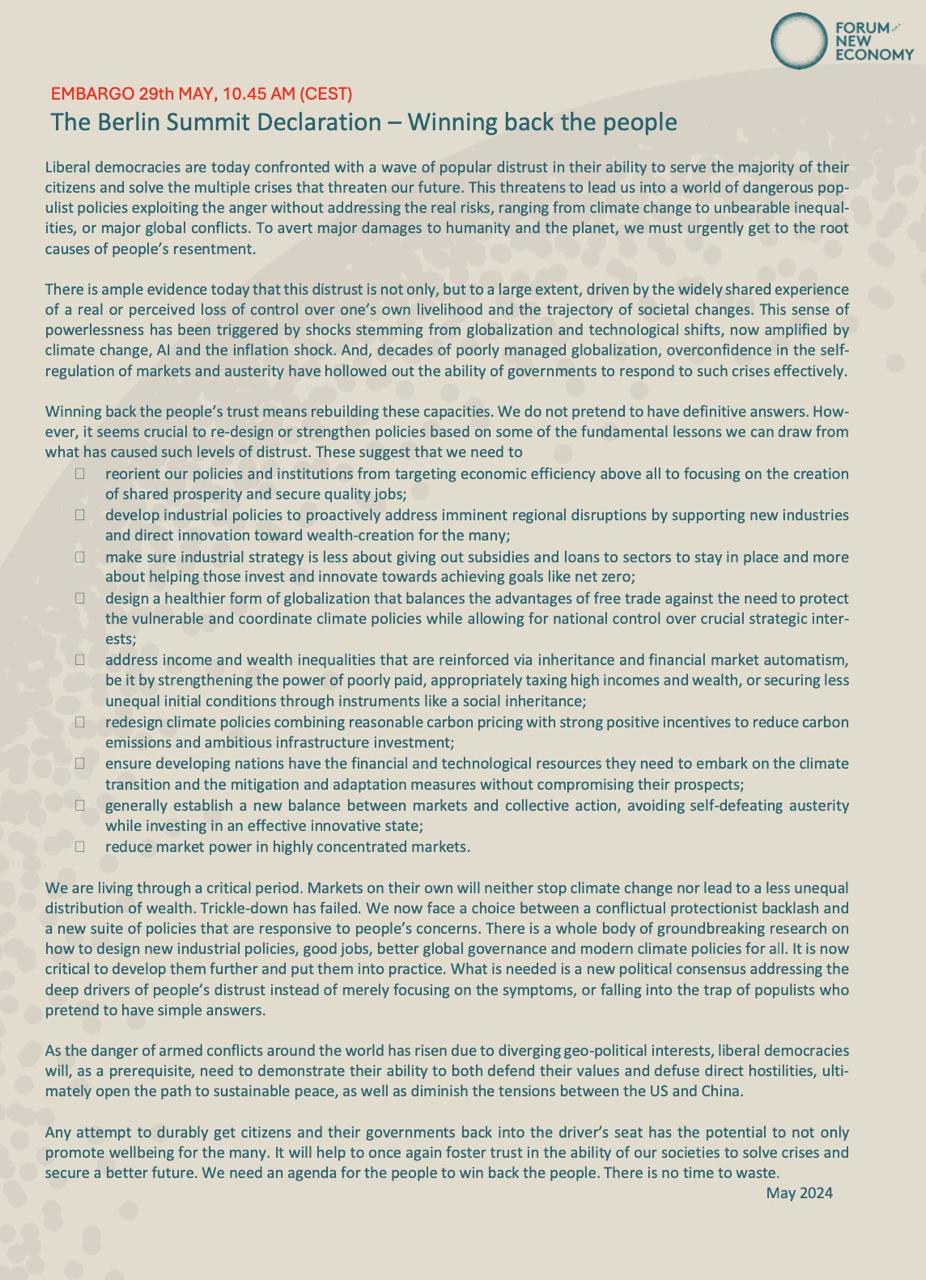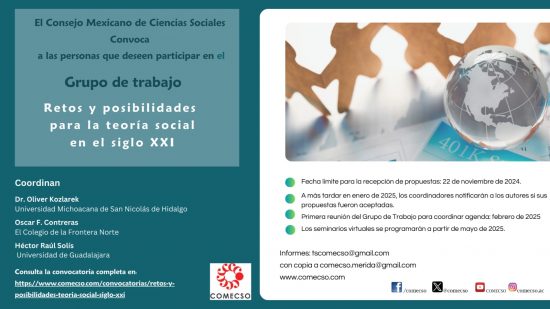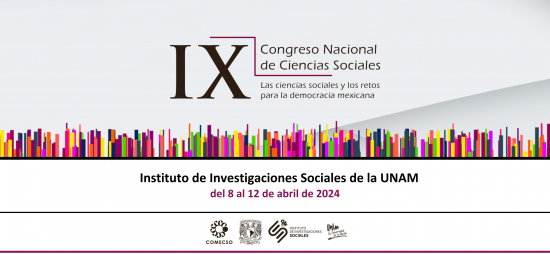The Berlin Summit Declaration – Winning back the people
Forum New Economy
PUBLISHED
29. MAY 2024
Liberal democracies are today confronted with a wave of popular distrust in their ability to serve the majority of their citizens and solve the multiple crises that threaten our future. This threatens to lead us into a world of dangerous populist policies exploiting the anger without addressing the real risks, ranging from climate change to unbearable inequalities, or major global conflicts. To avert major damages to humanity and the planet, we must urgently get to the root causes of people’s resentment.
There is ample evidence today that this distrust is not only, but to a large extent, driven by the widely shared experience of a real or perceived loss of control over one’s own livelihood and the trajectory of societal changes. This sense of powerlessness has been triggered by shocks stemming from globalization and technological shifts, now amplified by climate change, AI and the inflation shock. And, decades of poorly managed globalization, overconfidence in the self-regulation of markets and austerity have hollowed out the ability of governments to respond to such crises effectively.
Winning back the people’s trust means rebuilding these capacities. We do not pretend to have definitive answers. However, it seems crucial to re-design or strengthen policies based on some of the fundamental lessons we can draw from what has caused such levels of distrust. These suggest that we need to:
- reorient our policies and institutions from targeting economic efficiency above all to focusing on the creation of shared prosperity and secure quality jobs;
- develop industrial policies to proactively address imminent regional disruptions by supporting new industries and direct innovation toward wealth-creation for the many;
- make sure industrial strategy is less about giving out subsidies and loans to sectors to stay in place and more about helping those invest and innovate towards achieving goals like net zero;
- design a healthier form of globalization that balances the advantages of free trade against the need to protect the vulnerable and coordinate climate policies while allowing for national control over crucial strategic interests;
- address income and wealth inequalities that are reinforced via inheritance and financial market automatism, be it by strengthening the power of poorly paid, appropriately taxing high incomes and wealth, or securing less unequal initial conditions through instruments like a social inheritance;
- redesign climate policies combining reasonable carbon pricing with strong positive incentives to reduce carbon emissions and ambitious infrastructure investment;
- ensure developing nations have the financial and technological resources they need to embark on the climate transition and the mitigation and adaptation measures without compromising their prospects;
- generally establish a new balance between markets and collective action, avoiding self-defeating austerity while investing in an effective innovative state;
- reduce market power in highly concentrated markets.
We are living through a critical period. Markets on their own will neither stop climate change nor lead to a less unequal distribution of wealth. Trickle-down has failed. We now face a choice between a conflictual protectionist backlash and a new suite of policies that are responsive to people’s concerns. There is a whole body of groundbreaking research on how to design new industrial policies, good jobs, better global governance and modern climate policies for all. It is now critical to develop them further and put them into practice. What is needed is a new political consensus addressing the deep drivers of people’s distrust instead of merely focusing on the symptoms, or falling into the trap of populists who pretend to have simple answers.
As the danger of armed conflicts around the world has risen due to diverging geo-political interests, liberal democracies will, as a prerequisite, need to demonstrate their ability to both defend their values and defuse direct hostilities, ultimately open the path to sustainable peace, as well as diminish the tensions between the US and China.
Any attempt to durably get citizens and their governments back into the driver’s seat has the potential to not only promote wellbeing for the many. It will help to once again foster trust in the ability of our societies to solve crises and secure a better future. We need an agenda for the people to win back the people. There is no time to waste.
May 2024
***
Find the press release HERE.
Sign the declaration HERE.
Te puede interesar
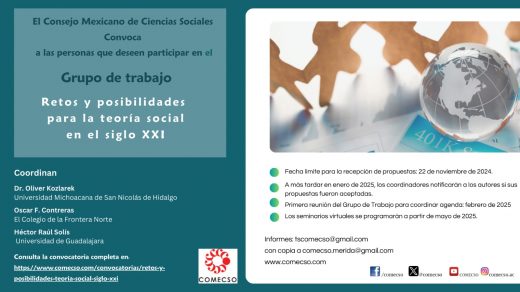
Retos y posibilidades para la teoría social en el siglo XXI
comecso - Nov 20, 2024El Consejo Mexicano de Ciencias Sociales, A.C. Convoca a las personas que deseen participar en el Grupo de Trabajo Retos…
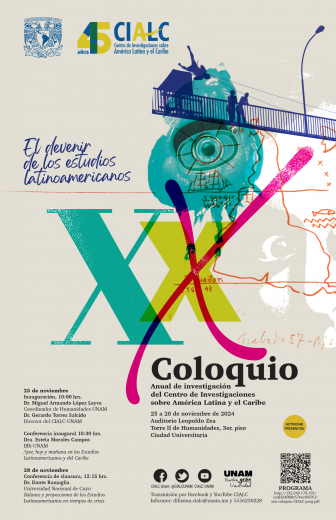
Coloquio anual de investigación del CIALC
Laura Gutiérrez - Nov 22, 2024Centro de Investigaciones sobre América Latina y el Caribe El devenir de los estudios latinoamericanos Coloquio anual de investigación del…

Imaginar futuros justos en la transición energética
Laura Gutiérrez - Nov 22, 2024La Cátedra UNESCO en Estudios del Futuro de la Universidad Autónoma Metropolitana, Unidad Cuajimalpa, en el marco de los trabajos…

Grupo de Trabajo El humor, la risa y las jerarquías
comecso - Nov 22, 2024Grupo de Trabajo El humor, la risa y las jerarquías Coords. Dr. Jorge Cadena-Roa y Dr. Mitl Maqueda Silva Ciclo…

